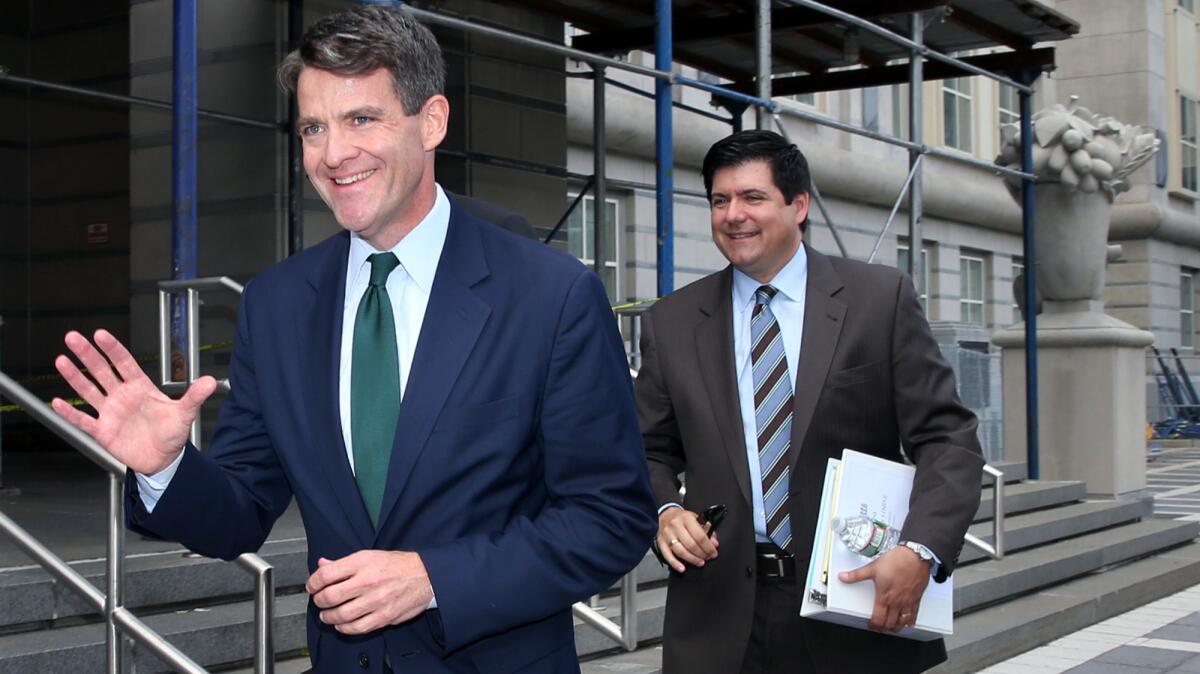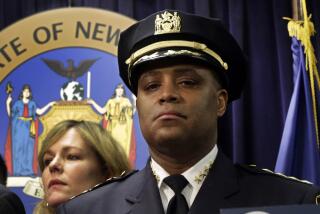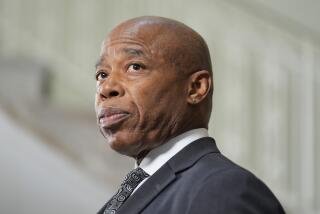Former Christie aides are on trial in the traffic jam scandal, and there are still unanswered questions

- Share via
Three years ago Thursday, the political horizon for New Jersey Gov. Chris Christie seemed limitless, perhaps stretching to the White House. He was a lock for re-election. Voters loved his blunt, plain-talking style. National Republican leaders swooned about his ability to attract support from Democratic voters in a blue state.
That day, Sept. 8, 2013, may have been the high point. Early the next morning, traffic cones went up in a New Jersey suburb of New York to block local access lanes to the George Washington Bridge.
The ensuing four-day traffic pileup in Fort Lee, eventually revealed as an act of political revenge by Christie’s aides against the town’s mayor, spawned federal indictments, crippled Christie’s presidential ambitions and earned a permanent place in the annals of lunatic political shenanigans.
On Thursday, jury selection began in the federal trial of two former top aides for Christie accused of orchestrating the plot, a trial that may reveal new details about lingering questions: Did anyone else know about the scheme, and when did they hear about it?
Bridget Anne Kelly, once Christie’s deputy chief of staff, and Bill Baroni, a top Christie appointment at the powerful Port Authority of New York and New Jersey, each face nine charges of fraud and conspiracy stemming from the 2013 traffic jam at the bridge, the world’s busiest. The Port Authority appointee who gave the orders to block the lanes, David Wildstein, has already pleaded guilty.
Baroni signed off on the plan, the indictment alleges, and later, during a legislative hearing, insisted that that it was just an experiment in traffic control. That story fell apart after an email Kelly sent to Wildstein surfaced: “Time for some traffic problems in Fort Lee.”
Christie has steadfastly denied knowing about the plot, blaming himself only for misplacing trust in “inexplicably stupid” employees. Three probes – including one run by Democrats in the state Legislature, and another commissioned by Christie – turned up no evidence to challenge that. But the three figures in the scheme have continued to push back against assertions that they acted alone, or that no one else in Christie’s inner circle knew afterward what had happened at the bridge.
“It is an absurd thought to believe that a member of the governor’s staff could close the George Washington Bridge,” Kelly said after her indictment last year. “Additionally, for the indictment to suggest I was the only person in the governor’s office who was aware of the George Washington Bridge issue is ludicrous.”
Wildstein, a high school classmate of Christie’s, has said that he told the governor about the lane closures while they were underway, during a 9/11 anniversary ceremony in New York. Christie has said that if Wildstein mentioned rush-hour jams, he didn’t remember it, but he was sure Wildstein never talked about a vindictive plot to snarl traffic.
It’s likely that some of the story has yet to be revealed, one veteran of New Jersey politics said.
“Who in the governor’s office did they speak to, either prior to this happening or once it blew up in their faces?” said Carl Golden, who worked as press secretary to Republican Gov. Thomas Kean and is now an analyst at the William J. Hughes Center for Public Policy. Golden said it’s still hard to imagine that Kelly – with relatively little high-level government experience – authorized the scheme on her own.
“If you ask people, ‘Was she capable of putting this together with Wildstein?’ … The answer, almost universally, is probably not,” Golden said.
Donald Trump suggested the same thing in December when Christie was challenging him for the Republican nomination.
“They’re with him all the time, the people who did it,” Trump said at a rally. “They never said, ‘Hey boss, we’re closing up the George Washington Bridge tonight’? … He knew about it, he totally knew about it.”
Two months later, Christie dropped out of the presidential race, endorsed Trump and later became head of his transition team.
Apart from the charges, the investigations revealed a culture of hardball politics in Christie’s office, striking even by rough New Jersey standards. Even as Christie was cruising to reelection as governor in 2013, emails show that employees in his office, supervised by Kelly, were pushing to corral endorsements from local officials around the state. Jersey City’s mayor was frozen out when he didn’t endorse Christie, emails show, and Fort Lee’s Democratic mayor, Mark Sokolich, became a target when he decided he couldn’t cross party lines to back the governor.
Kelly’s lawyers intend to make that part of her defense. The office’s way of operating was “established long before she took over” and Kelly’s actions were “not aberrational or outside the scope of her employment,” they wrote in a brief in June.
The investigation also unearthed a separate scandal involving former Port Authority Chairman David Samson, previously New Jersey’s attorney general and one of Christie’s closest allies. In July, Samson pleaded guilty to one count of bribery, admitting that he used his position to strong-arm United Airlines into restoring a little-used and unprofitable flight from Newark, N.J., to Columbia, S.C., that made it easier for Samson to visit his vacation home on weekends. After he resigned, United Airlines quickly dropped the route, known as “the chairman’s flight.”
In the run-up to the trial, there has been renewed pressure on prosecutors and Christie’s lawyers to release more information. This week, a federal appeals court ruled that a list of unindicted co-conspirators in the case should remain secret, turning away a request from news organizations to release it. One of the people on the list, known only as John Doe, sued to block the release, saying it would unfairly tar his reputation.
And last month, lawyers for Baroni released a new text exchange between Christie aides, made as the governor talked about the bridge mess at a 2013 news conference.
“Are you listening? He just flat out lied about senior staff and Stepien not being involved,” wrote Christina Genovese Renna, referring to Bill Stepien, Christie’s two-time campaign manager. “If emails are found with the subpoena ... if it comes to that it could be bad.” Christie said the allegation that he lied was “ridiculous” and “nothing new.”
Stepien was abruptly fired by Christie after embarrassing emails came to light. He has not been charged with wrongdoing and has also denied any involvement in the bridge plot. Stepien is now working for the Trump campaign.
Twitter: @jtanfani
ALSO
‘I’m just lost.’ Voters find it hard to commit to Clinton or Trump
Clinton pressed on emails and Trump defends praising Putin as they compete for military support
Obama tells voters to reject Donald Trump’s ‘outright wacky ideas’
More to Read
Get the L.A. Times Politics newsletter
Deeply reported insights into legislation, politics and policy from Sacramento, Washington and beyond. In your inbox three times per week.
You may occasionally receive promotional content from the Los Angeles Times.











